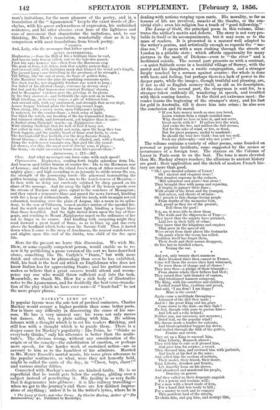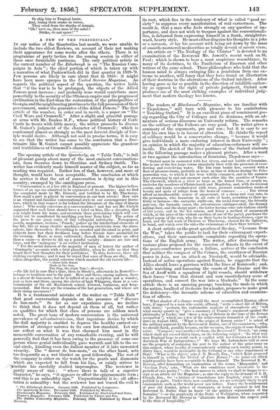11ACRAT'S LUMP OF GOLD. * IF popular favour were the sole
test of poetical eminence Charles Mackay would mow a higher position than some better poets. Nor is there any difficulty in discovering the cause of his suc- cess. He has a very musical ear,: his verse not only moves but dances. All, too, is plain sailing with him. He seldom labours with a thought which is to set his readers thinking, and still less with a thought which is to puzzle them. There is a deeper cause for Mackay's popularity : like' Poins, he " thinks as everybody thinks," only Ins utterance is better than the multi- tudes. The obvious wrong, without any consideration of the origin or of the remedy—the substitution of emotion, or perhaps mere speech, for the harder work of sustained action—are as savoury to him as to the humblest of his admirers Married to Mr. Henry Russell's mortal music, his Verse gives utterance to the popular sentiments, or what, were they not honestly held, might be called the cants of the day, in "Cheer, boys, cheer!" and various similar ditties.
Connected with Mackay's merits are kindred faults. He is so superficial that he rarely gets below the surface, gliding over a subject instead of penetrating it. His facility is so ve facile that it degenerates into glibness : it is 'like railway trave when we get to the journey's end there are few distinct impres- sions of anything ; unless it be in the writer's lyrics, where he is
• The Lump Of Gold; and other POMN.I. By Charles Mackey, Author 5,r" The gialamandrine," 4.e. Published by B.outledge, dealing with notions verging upon cants. His morality, so far as lessons of life are involved, smacks of the theatre, or the con- vivial club ; even his religion has a touch of "good fellowship." The Lump of Gold, the principal poem in this volume,illus- trates the author's merits and defects. The story is not very pro- bable in itself or its accompaniments, but it may seem so to the mass of readers. It is presented in a manner well adapted to the writer's genius, and artistically enough as regards the "me- dies res." It opens with a man rushing through the streets of London in a pitiable state ; which affords opportunity for many pictures in the mode of Dickens—even to "the river" and a meditated suicide. The second part presents us with a contrast, —a quiet Sabbath scene in a beautiful village of Surrey, with the pastor and his daughters, a rustic congregation, and a stranger deeply touched by a sermon, against avarice: the whole is done with taste and feeling, but perhaps there is a lack of power in the deeper parts, while the images, though truthful and pleasing, are, if not as old as English scenery itself, as old as its description. At the close of the second part, the clergyman is sent for, to a stranger taken suddenly ill, wandering in speech, and troubled with thick coming fancies. In the third act extremes meet: the reader learns the beginning of the stranger's story, and his lust for gold in. Australia, till it drove him into crime ; he also sees the conclusion and its moral.
"If you hate money much as once you loved, Learn wisdom from a simple-minded man. Why should we love or hate it, and not serve Great needs with it ? If sailors love the wind, And cooks the fire, and millers the full stream, Not for the sake of wind, or fire or flood, But for great purpose, useful fire, • So should the wise love Gold—but not too well. Such my philosophy—and why not yours ? "
The volume contains a variety of other poems, some founded on. personal or popular incidents, some suggested by the scenes or occurrences of a foreign tour. The stanzas on the Column of Luxor in Paris seem to us the best. The tone is more elevated than Mr. Mackay always reaches • the allusions to ancient history are good ; their application and the sketch of modern French his- tory are more than good. "Oh! grey-headed CAM= of Luxor !
Oh! tuicient and eloquent stone ! That standest supreme in thy sadness, 'Mid splendour and glare—but alone ! They brought thee with pomp and rejoicing, A trophy to pamper thew fame ; With sound of the drum and the trumpet, And salvos, and shouts of wham : Oh! preach to this change-loving people From depths of thy memories vast,
And, proud as they are of the present,
Tell them the past !
Yet, no, it were idle to show them The waifs and the shipwrecks of Time ;— They know that the mighty have perished, Laid low in their folly or crime.
They know that the kingdoms and empires That grew in the ages of old Were swept from their places like footmarks
On sands where the 'ocean has rolled.
Tradition itself has forgot them Their deeds and their names disappear, Or live but in falsified echoes,
Vexing the ear.
* * 5,
And yet, only twenty short summers
Have bloomed since thou easiest to France.
Come tell them the scenes thou hast witnessed, To warn them of change and of chance !
They bore thee—a pledge of their triumph— From shores where their fathers had bled; ' They raised thee 'mid thunder of cannon, And tricoloured banners outspread. The King, with his courtiers and children,
• Looked round him, exulting and proud,
And said, I am firm ! I am happy ! Mine is the crowd.'
Again came a multitude thronging— Ashamed of the idol they made ;
And lo ! the great King ancl his glory Came down to the dust—as they bade !
He fled, though with none to pursue him—
And left not a relic behind ;
Neither son, nor successor, nor mourner;
Dried leaf, on the popular wind! His throne made a bonfire for outcasts, And blood-sprinkled beggars lay down, And trailed through the filth of the gutter, Ermine and crown.
They set up a King to succeed him, King Liberty, Monarch adored ; They told him to rule as it pleased him, And gave him for sceptre, a sword. . . They throned him, and crowned him with garlands, And knelt at his feet in the mire; And called him the saviour of nations,
Their model, their friend, their desire.
King Liberty, drunken and frantic, Let Anarchy loose on his slaves, And plundered and-murdered his people, Dancing on graves.
And they called in their desperate anguish For a potent and resolute will; For a man with a heart made of iron, For a hand that was ready to kill ; For a master to curb and to conquer This pestilent lord of the streets,
To chain him, and gag him, and adtreittiti,
Or ship him to Tropical heats. And, losing their senses in terror
They cried from the depths of despair,
Oh ! save us, thou man of the sabre I Strike, do not spare !' "











































 Previous page
Previous page